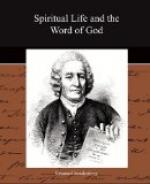The tenth commandment is “Thou shalt not covet (or try to get possession of) thy neighbor’s wife, his man-servant, or his maid-servant, his ox, or his ass.” These are lusts after what is man’s own, because the wife, man-servant, maid-servant, ox, and ass, are within his home, and the things within a man’s home mean in the spiritual internal sense the things that are his own, that is, the wife means affection for spiritual truth and good, “man-servant and maid-servant,” affection for rational truth and good serving the spiritual, and “ox and ass” affection for natural good and truth. These signify in the Word such affections; but because coveting and trying to get possession of these affections means to wish and eagerly desire to subject a man to one’s own authority or bidding, it follows that lusting after these affections means the lusts of the love of self, that is, of the love of ruling, for thus does one make the things belonging to a companion to be his own.
From this it can now be seen that the lust of the ninth commandment is a lust of the love of the world, and that the lusts of the tenth commandment are lusts of the love of self. For, as has been said before, all lusts are of love, for it is love that covets; and as there are two evil loves to which all lusts have reference, namely, love of the world and love of self, it follows that the lust of the ninth commandments has reference to love of the world, and the lust of this commandment to love of self, especially to the love of ruling. (A.E., n. 1022.)
X. The Commandments in General
The commandments of the Decalogue are called the ten words or ten commandments, because “ten” signifies all; consequently the ten words mean all things of the Word, and thus all things of the church in brief. All things of the Word and all things of the church in brief are meant, because there are in each commandment three interior senses, each sense for its own heaven, for there are three heavens. The first sense is the spiritual moral sense; this is for the first or outmost heaven; the second sense is the celestial spiritual sense, which is for the second or middle heaven; and the third sense is the Divine celestial, which is for the third or inmost heaven. There are thus three internal senses in every least particular of the Word. For from the Lord, who is in things highest, the Word has been sent down in succession through the three heavens even to the earth, and thus has been accommodated to each heaven; and therefore the Word is in each heaven and I may say in each angel in its own sense, and is read by them daily; and there are preachings from it, as on the earth.




